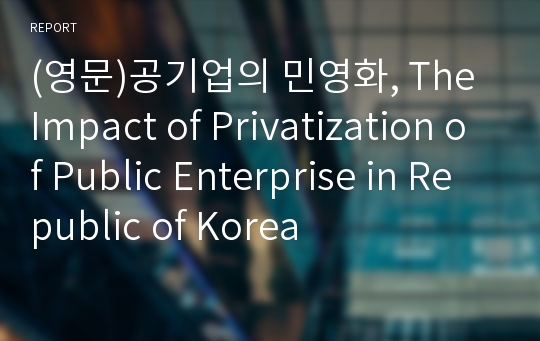(영문)공기업의 민영화, The Impact of Privatization of Public Enterprise in Republic of Korea
*준*
다운로드
장바구니
소개글
공기업의 민영화가 미치는 영향. Privatization of Public Enterprise목차
CHAPTER 1 - INTRODUCTION1.1 Background of the study
1.2 Statement of the problem
1.3 Research Objectives
1.4 Limitation
1.5 Significance of the study
1.6 Scope of the study
CHAPTER 2-LITERATURE REVIEW
2.1 Concept of Privatization
2.2 The arguments related to the privatization of essential services
2.3 History of Privatization in Korea
CHAPTER 3-RESEARCH METHOLOGY
3.1 Theoretical Framework
3.1.1 Change role
3.1.2 Poor management
3.1.3The deficit finance
3.2 Generation of Hypothesis
3.3 Privatization Methods
3.3.1Trade sales
3.3.2 Share offerings
3.3.3 Management-Employee Buyouts
3.3.4 Corporatization
3.4 Conclusion
CHAPTER 4-AN INVESTIGATION INTO THE IMPACT OF PRIVATISATION
4.1 Necessity for Privatization of Public Enterprises in Korea
4.1.1 Loss of Reasons for Existence of Public Enterprises
4.1.2 Presence of Significant Economic Inefficiencies
4.1.3 Problems with the Government’s Opportunistic Interference and Policy Strategy
4.2 Impacts of Privatization
4.2.1 Impacts of Internal Management in Enterprise
4.2.2 Impacts on Monopoly and Economic Power Concentration
4.2.3 Impacts on Government
4.2.4 Impacts on Capital Market and Securities Market
4.2.5 Impacts on the Entire Nation
CHAPTER 5 CHALLENGES AND RECOMMENDATIONS
5.1 Challenges of Privatization
5.1.1 Economic power concentration
5.1.2 Government’s deregulation and introduction of competition
5.1.3 Split privatization
5.2 Recommendations
5.2.1 Strong commitment of the government.
5.2.2 Expand the selection
5.2.3 Diversification
REFERENCES
본문내용
ABSTRACTPrivatization is closely connected with diverse factors of the institutional history, political relations and international environments. That is to say, Privatization should be understood as outcomes of the clashes and struggles of the multiple subjects of privatization. However, Korea government tends to use privatization as a political purpose with little thought of important matters. As a result, recently, a lot of Korea people have doubt how privatization impacts public enterprise and give benefits to citizens. It seems that privatization is not the only answer and solves the current problems. Therefore, we need to understand the change process from government-owned enterprise to private and take a look at theories of privatization
<중 략>
5.2.3 Diversification
For the improvement plan for privatization, the government divides public enterprises into a government enterprise, a government-funded institution, a government-owned institution, a government-funded institution-subsidiary, and a local public enterprise. Privatization can partially proceed by converting a government enterprise into a government-funded institution.
참고 자료
Bayliss, K. (2002). Privatization and Poverty: The distributional impact of Utility Privatization. Public service International research Unit. Working Paper No. 16 (1).Birdsall, N.andNellis, J. (2003). Winners and losers: Assessing the distributional impact of privatization. World Development.
Oh, Myoung. and Larson, J. (2011) Digital development in Korea. Abingdon, Oxon: Routledge.
Kay, B.J. and Mayer, C. (1994).Privatization and Economic Performance.Oxford University press.
Adnan, F. (2005) Impact of Privatization on Economic Growth. Furman University, 14 (3), p.1-7.
Alkhafaji, A. (1993) Privatization: An Overview. Journal of Organizational Change Management, 6 (3), p.1-24.
Hsueh-Liang, W. (2007) Exploring the sources of privatization-induced performance changes. Journal of Organizational Change Management , 20 (1), p.1-10.
Yoshihiro, T. (1998) Privatization of public enterprises and its problems in Japan. International Journal of Social Economics , 25 (2/3/4).
Gupta, S., Schiller, C., and Ma, H. (1999).Privatization, Social Impact, and Social Safety.
Nets.IMF Working Paper WP/99/69. Washington DC: IMF.
Birdsall, N.andNellis, J. (2003). Winners and losers: Assessing the distributional impact of privatization. World Development 13 (10): 1617-33.
Vickers, J. and Yarrow, G. (1991).Economic Perspectives on Privatization.Journal of Economic Perspectives. Vol. 5, No2 (Spring), 111-132.
Basu, P. (1994). Demystifying privatization in developing countries. International Journal of Public Sector Management, 7(3), pp.44--55.
BRADFORD, S. (2001). George Miller, On Fairness and Efficiency: the privatisation of the public income over the past millennium, Bristol, The Policy Press, 2000, ix+ 470 pp.,pounds 55.00. Journal of Social Policy, 30(04), pp.735--774.
Kim, J. and Rowley, C. (2001).Managerial problems in Korea-Evidence from the nationalized industries. International Journal of Public Sector Management, 14(2), pp.129--149.
M"uller, A. and L, e. (1997).The creation of a growth-oriented society in Korea. International Journal of Social Economics, 24(1/2/3), pp.178--189.
Piasecki, R. and Wolnicki, M. (2004).The evolution of development economics and globalization. International Journal of Social Economics, 31(3), pp.300--314.
Toyama, Y. (1998). Privatization of public enterprises and its problems in Japan. International Journal of Social Economics, 25(2/3/4), pp.388--398.
BKL.co.kr (2003) Privatization of Public Enterprises in Korea. [online] Available at: http://www.bkl.co.kr/data/data1_47.pdf [Accessed: 12 may 2013].
etd.uwc (2013) AN INVESTIGATION INTO THE IMPACT OF THE PRIVATIZATION OF PUBLIC UTILITIES [online] Available at: http://etd.uwc.ac.za/usrfiles/modules/etd/docs/etd_init_3786_1174050576.pdf [Accessed: 24 may 2013].
knsi.org (2013) http://knsi.org/knsi/admin/work/works/ref_lwh_030114.pdf. [online] Available at: http://knsi.org/knsi/admin/work/works/ref_lwh_030114.pdf [Accessed: 12 may 2013].
Koreatimes.co.kr (2012) Economics of privatization. [online] Available at: http://www.koreatimes.co.kr/www/news/bizfocus/2013/01/330_113655.html [Accessed: 1 Jun 2013].
lo.org (2013) The Impact of Decentralization and Privatization on Municipal Services . [online] Available at: http://www.ilo.org/public/english/standards/relm/gb/docs/gb283/pdf/jmmsr.pdf [Accessed: 1 Jun 2013].
OECD.org (2013) Privatisation in the 21st Century: Recent Experiences of OECD Countries. [online] Available at: http://www.oecd.org/daf/ca/corporategovernanceofstate-ownedenterprises/48476423.pdf [Accessed: 1 Jun 2013].
Unescap.org (2013) PRIVATIZATION ISSUES. [online] Available at: http://www.unescap.org/ttdw/publications/tfs_pubs/pub_1855/pub_1855_ch4.pdf [Accessed: 11 may 2013].
Econ.worldbank.org, (2014). Data & Research. [online] Available at: http://econ.worldbank.org/ [Accessed 22 May. 2014].
Kwak Su il (1989). Investigation of Public enterprise about progress direction of Privatization.Korea Economic Research Institute (In Korean)
Nam ilchong (1999) Present and future of privatization of public enterprise. Korea SOEs Society (In Korean)
AnHoon (2004) Study improvement plan of privatization in Korea. Konkook University (In Korean)
Yu Hoon (1992) Theory of public enterprise.BoubMoonSa. (In Korean)
Lee ByoungHoon and Hwang Duk Soon (2000).Relationship between public and private in privatization.Korea Labour Institution. (In Korean)



























